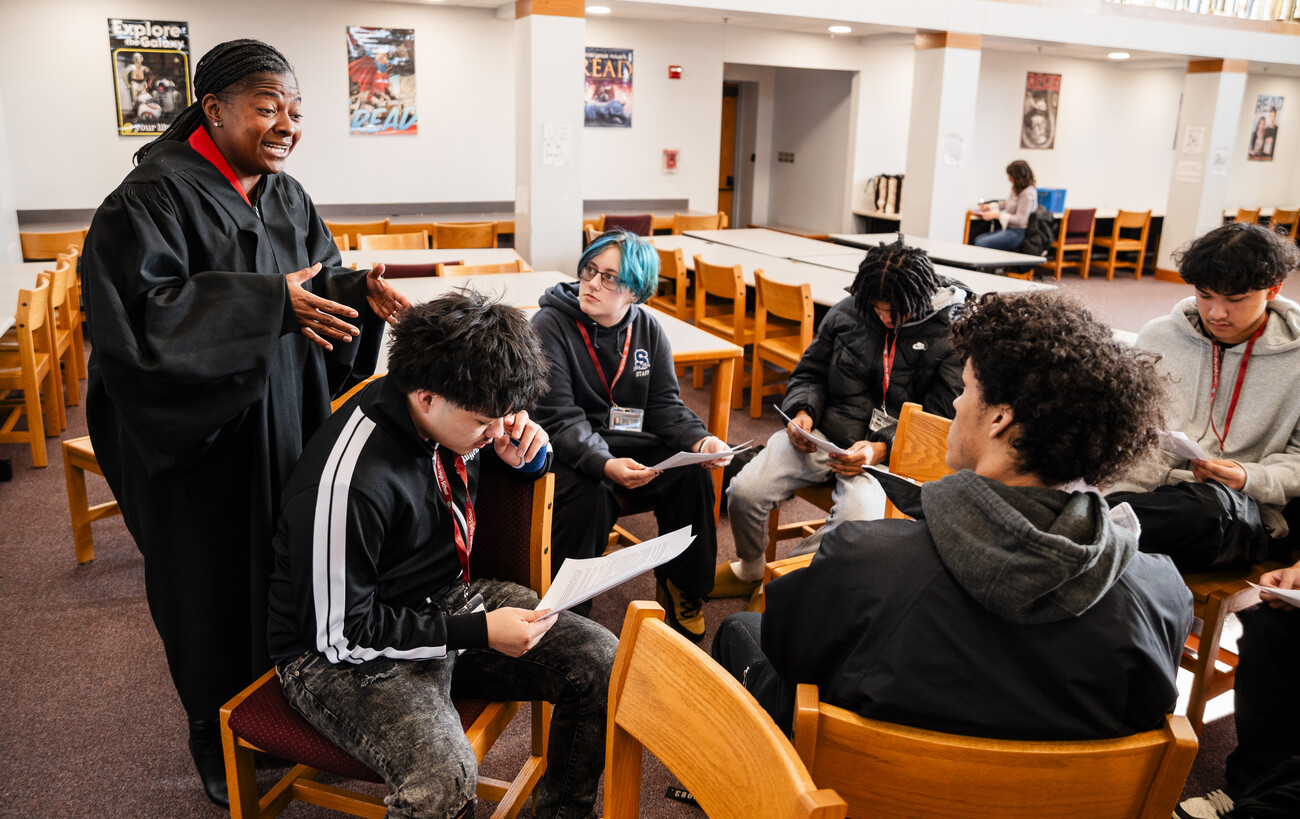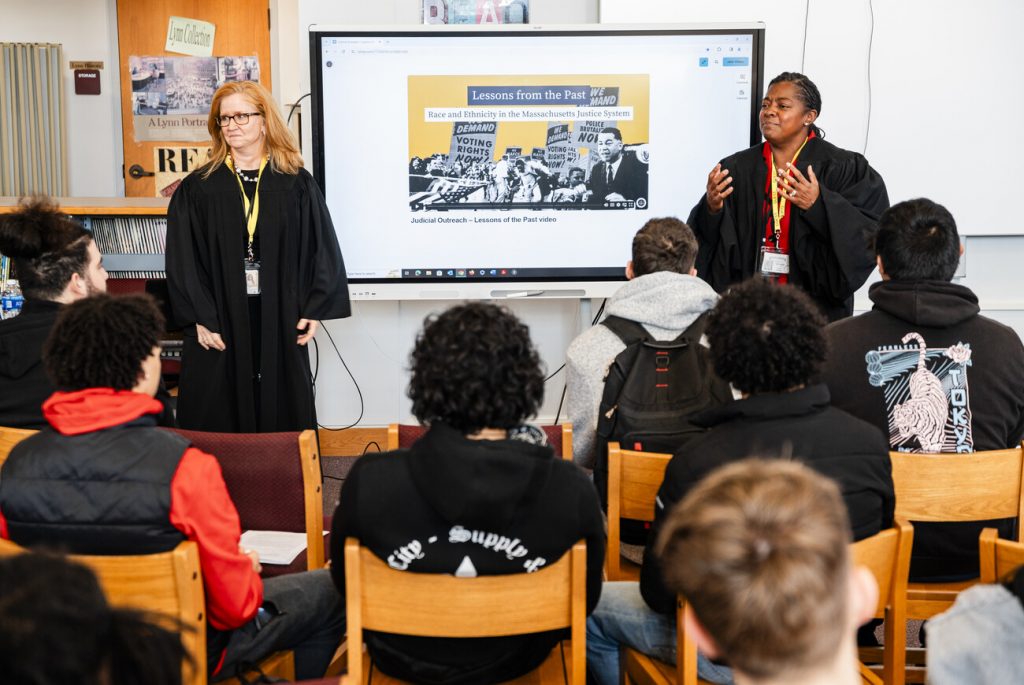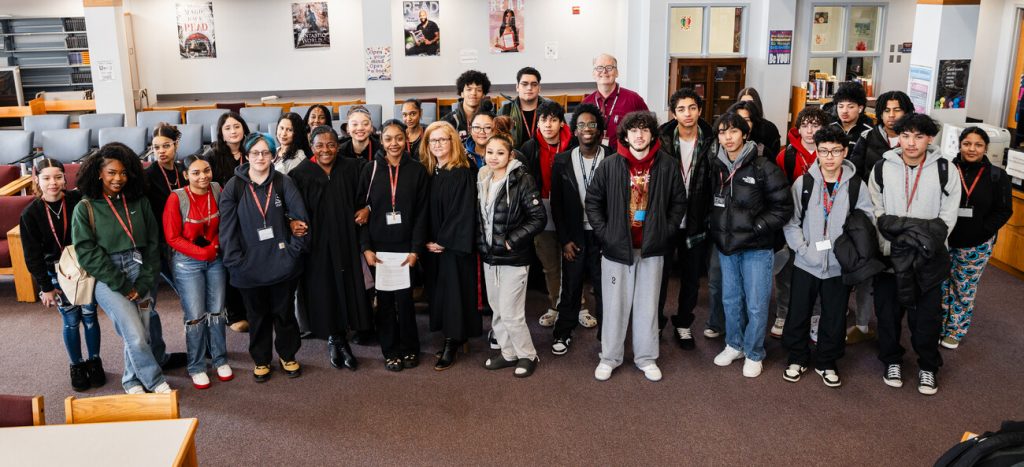
 press-releases
press-releases 
LYNN — In celebration of Judiciary Outreach Month, Lynn English High School hosted Lynn District Court First Justice Hon. Ina Howard-Hogan and Essex Juvenile Court Associate Justice Hon. Kathryn Phelan-Brown on Friday.
The two judges walked students through the role of the judiciary in the United States.
“You should know about the criminal justice system. It’s not all about putting people in jail. It’s about (people) learning about the system, and making that system work for all of us equally,” Howard-Hogan said.

Both Howard-Hogan and Phelan-Brown graduated from Lynn English in 1986 and became judges in 2016.
“I am born and raised and remain in Lynn and committed to Lynn,” Phelan-Brown said.
One class participated in the interactive program “You be the Judge,” which was hosted by Phelan-Brown and Howard-Hogan.
The students watched videos explaining the concept of bail. The videos summarized what bail is, the purpose of setting or denying bail, factors the judge may consider when making a decision about bail, and why bail is used due to defendants’ “risk of flight.”
Then, the students were divided into three groups and watched three trial court examples. Each group was assigned one of the examples and had to decide, as the judge, what to set the bail at.
“You’re going to make the decision as to what you would do with this case,” Howard-Hogan said.
One representative from each group approached the front of the class, acting as the judge, and gave their group’s decision. The students selected by the groups were Medy Florestal, Cole Kiiza, and Danivel Diroche.
Kiiza said he hopes to be a police officer, lawyer, and eventually a judge when he grows up.

“(I) want to be the change I want to see. Policing’s obviously dominated by, predominantly, white males. And (you) have to represent your community and the people you want to serve,” Kiiza said. “I want to make a change in people’s lives.”
Howard-Hogan informed the students about a project the Massachusetts court system is currently working on called the “blind bail project,” to see how big the disparity is between the bail set for white defendants and defendants of color.
“We’re trying to see if, in fact, that’s something judges do unconsciously, take (race) into consideration,” Howard-Hogan said. “I have checked myself all the time because, you know, when you look at the scenario, are you looking at (it) based on the scenario itself or the person before you?”
“We check ourselves every time we walk into the courtroom, and we are trying to serve justice to everyone equally, regardless of their race, identity, their ethnicity, their language,” Phelan-Brown said in addition.
Toward the end of the program, Diroche asked the judges how they knew they wanted to pursue careers in the legal system.
Howard-Hogan said she knew when she was in the sixth grade, and her passion hasn’t wavered since.
“I had an older brother that was always in trouble, and so my mom, a single mom, would bring me to court… and I would sit there and I’m watching everything that was going on in the courtroom,” Howard-Hogan said. “It was just fascinating to me, and what’s so interesting about that is that same court that I sat in watching my brother get in trouble, is the court that I preside in right now.”
Phelan-Brown said her mother, an attorney, was her role model. Her mom was one of the only women in her law school, and was told she shouldn’t make as much money as her male counterparts.
“She was told she should be home, barefoot and pregnant, that she should not be practicing law,” Phelan-Brown said. “My father told me that I can do whatever I want and I looked up to (my mother). She went to work everyday, she came home (and) cooked meals for eight children every day.”

24World Media does not take any responsibility of the information you see on this page. The content this page contains is from independent third-party content provider. If you have any concerns regarding the content, please free to write us here: contact@24worldmedia.com